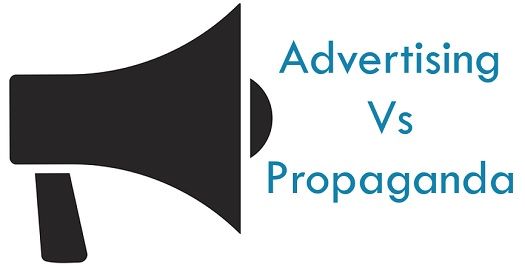 Advertising, needs no introduction, as it is something which we all are quite aware of. We come across hundreds of advertisements, in a day while reading the newspaper, using internet or social media sites, watching TV, travelling on the roads, etc. It uses the multimedia platform to promote a product, service or event, by using various innovative and thought-provoking ideas, so as to persuade customers in such a way that they buy or try the product or service.
Advertising, needs no introduction, as it is something which we all are quite aware of. We come across hundreds of advertisements, in a day while reading the newspaper, using internet or social media sites, watching TV, travelling on the roads, etc. It uses the multimedia platform to promote a product, service or event, by using various innovative and thought-provoking ideas, so as to persuade customers in such a way that they buy or try the product or service.
Advertising is often confused with the word propaganda, but these two are completely different. Propaganda is a part of a large cognitive campaign mainly used by political parties or social groups to circulate information which not purely correct, rather biased or misleading, so as to promote their point of view.
In this article, we are going to talk about the differences between advertising and propaganda, so let’s have a look.
Content: Advertising Vs Propaganda
Comparison Chart
| Basis for Comparison | Advertising | Propaganda |
|---|---|---|
| Meaning | Advertising refers to a marketing tactic, used by the companies to promote the product and services, retain old customers and draw the attention of targeted ones. | Propaganda is nothing but information which aims at misleading or persuading people, by changing their attitude and perception, towards the product or service. |
| Tells people | What to buy? | What to think? |
| Objective | To grab public attention and change consumer preference. | To twist facts and information to change public opinion by misleading the target audience. |
| Intent | It intends to highlight the qualities present in a product or service to sell them. | It intends to use hyperbole, to influence public opinion and views. |
| Outcome | Increase in the company's sales. | Attaining majority or superiority over something. |
| Usage | Primarily used in the consumer market to promote a product, service or event. | It is used in the consumer market, political and social matters, and in the matters of discrimination and equality. |
Definition of Advertising
Advertising is one of the four tools of promotion, which implies a commercial activity of communicating the qualities and spreading awareness about the product, service, idea, event, people, places, or organizations so as to raise their interest in it and convert them from the audience to buyers or customers.
Advertising is a non-personal and persuasive means of communication, wherein the sponsor needs to pay for placing the advertisement. Advertising is done with the intention to reach the maximum number of people, in one go.
Advertisement or otherwise called as the ad is nothing but the main promotional message, proclaimed by an identified sponsor in order to promote their product or service. It aims at informing or instigating the target audience to continue or take a certain action.
The sponsors of the advertisement possess full control over the message transmitted through various channels, as it is thoughtfully designed to draw the attention of the target audience.
Advertising is performed using various traditional methods like print media which encompasses advertising through magazine, newspaper, brochures, fliers, posters, etc., billboards, broadcast advertising (television, radio, internet), and modern methods like digital advertising which includes social media advertising, search and display advertising, email advertising, contextual advertising, mobile advertising, pop-ups, etc.)
Definition of Propaganda
Propaganda is a non-objective set of messages directed to the public at large which can be facts, rumours, half-truths etc., typically meant for manipulating the opinion, ideas, views or attitude of the group towards something, so as to support a cause, to change a social trend, or to advance a political agenda by using language-persuasive techniques so as to invoke an irrational or emotional response from them.
Propaganda may or may not be negative, which tends to stress on the plus points and righteousness of an idea or group, and at the same time distorting the facts and truths, along with suppressing the criticisms and counter-arguments.
It can take the form of speech, movies, documentaries, short films, music, speeches, artwork and so forth. It attempts to presents a single side of an issue as if it were an absolute truth.
Propaganda is a deliberate and biased information spread by an individual or a group thereof called as propagandist, aiming to influence the target group, to accept the selected facts/arguments or adopt their ideas, or think and act in a certain manner, for which they make use of symbols and loaded language to get desired response.
Key Differences Between Advertising and Propaganda
The difference between advertising and propaganda can be drawn clearly on the following grounds:
- Advertising is an effort of an intended sponsor to persuade the target group, with a highly-tailored message, i.e. advertisement, concerning the product or service, in order to increase the sales of the company. Conversely, Propaganda is a uni-directional form of communication, used for promoting a particular idea or viewpoint or a political cause.
- Advertising often tells people “what to buy” i.e. out of hundred products and varieties, which product fulfils their need perfectly. As against, propaganda tells people “what to think” as it is a deliberate message presented in such a way to manipulate the thinking ability of the target group and adopt a certain idea or behaviour.
- In advertising, an advertisement is designed innovatively, to grab public attention and promoting the product or service, in such a way that people are impelled to buy the same. On the contrary, Propaganda does not aim at selling the product or service, rather it intends to spread the thought or idea to change the mindset of people towards something.
- The end result of advertising is the increase in sales of the company, which in turn increases the market share, and overall customer base. Conversely, the final outcome of propaganda is to attain majority or superiority over something.
- Advertising is commonly used in the consumer market so as to induce customers to buy a certain commodity. On the other hand, propaganda can be used in a number of matters, i.e. in consumer market, political, religious and social matters, and in the matters of discrimination and equality.
- When it comes to sponsorship, advertising is openly and deliberately sponsored. Contrary to this, propaganda is deliberate, but it may or may not be openly sponsored.
Conclusion
In the present scenario, these advertising and propaganda are widely used and are ever-present, no matter whether we recognize it or not. While advertising is performed to promote the sale of a product or service, propaganda is all about favouring, opposing or criticizing a person, idea, trend or cause, to achieve a certain political or economic end.






Vincent T DiFranco says
Good stuff. would like to learn more about the dangers of propaganda
Thanks